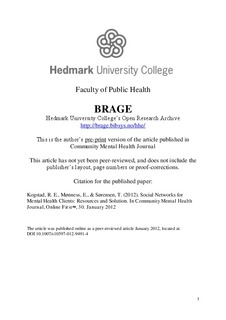| dc.contributor.author | Kogstad, Ragnfrid Eline | |
| dc.contributor.author | Mønness, Erik Neslein | |
| dc.contributor.author | Sørensen, Tom | |
| dc.date.accessioned | 2012-03-20T07:59:31Z | |
| dc.date.available | 2012-03-20T07:59:31Z | |
| dc.date.issued | 2012 | |
| dc.identifier.citation | Kogstad, R. E., Mønness, E., & Sørensen, T. (2012). Social Networks for Mental Health Clients: Resources and Solution. In Community Mental Health Journal 44(1).
Publisert online 2012 på: http://www.springerlink.com/content/r088142300078157/fulltext.pdf | no_NO |
| dc.identifier.issn | 0010-3853 | |
| dc.identifier.uri | http://hdl.handle.net/11250/134378 | |
| dc.description | Dette er forfatters pre-print versjon av artikkelen. Artikkelen slik den foreligger her er ikke fagfellevurdert, og mangler forlagets layout, sidetall og siste korrekturrettelser. Publisert, fagfellevurdert artikkel finnes på: http://www.springerlink.com/content/r088142300078157/fulltext.pdf | no_NO |
| dc.description.abstract | Engelsk sammendrag (abstract): Background: Several studies have illustrated the importance of social support and social networks for persons with mental health problems. Social networks may mean a reduced need for professional services, but also help to facilitate access to professional help. The interplay between social networks and professional services is complicated and invites further investigation.
Aim: Compare aspects of clients’ experiences with social networks to experiences with professional services and learn about the relationship between network resources and help from the public health service system.
Method: Quantitative analyses of a sample of 850 informants.
Results: Supportive networks exist for a majority of the informants and can also be a substitute for public/professional services in many respects. Regarding help to recover, social networks may offer qualities equal to those of professional services. Furthermore, there is a positive relationship between trust in a social network and trust in public professional services. Trust in a social network also increases the probability of achieving positive experiences with professional services.
Conclusion: Our findings imply that more network qualities should be included in professional services, and also that professionals should assist vulnerable groups in building networks. | no_NO |
| dc.language.iso | eng | no_NO |
| dc.publisher | Springer | no_NO |
| dc.relation.uri | http://www.springerlink.com/content/r088142300078157/fulltext.pdf | |
| dc.source.uri | http://www.springerlink.com/content/r088142300078157/fulltext.pdf | |
| dc.subject | sosiale nettverk | no_NO |
| dc.subject | psykisk helse | no_NO |
| dc.subject | nettverk | no_NO |
| dc.subject | sosial støtte | no_NO |
| dc.title | Social Networks for Mental Health Clients: Resources and Solution | no_NO |
| dc.type | Journal article | no_NO |
| dc.type | Peer reviewed | no_NO |
| dc.subject.nsi | VDP::Medical disciplines: 700::Health sciences: 800::Other health science disciplines: 829 | no_NO |
| dc.source.volume | 44 | no_NO |
| dc.source.journal | Community Mental Health Journal | no_NO |
| dc.source.issue | 1 | no_NO |
